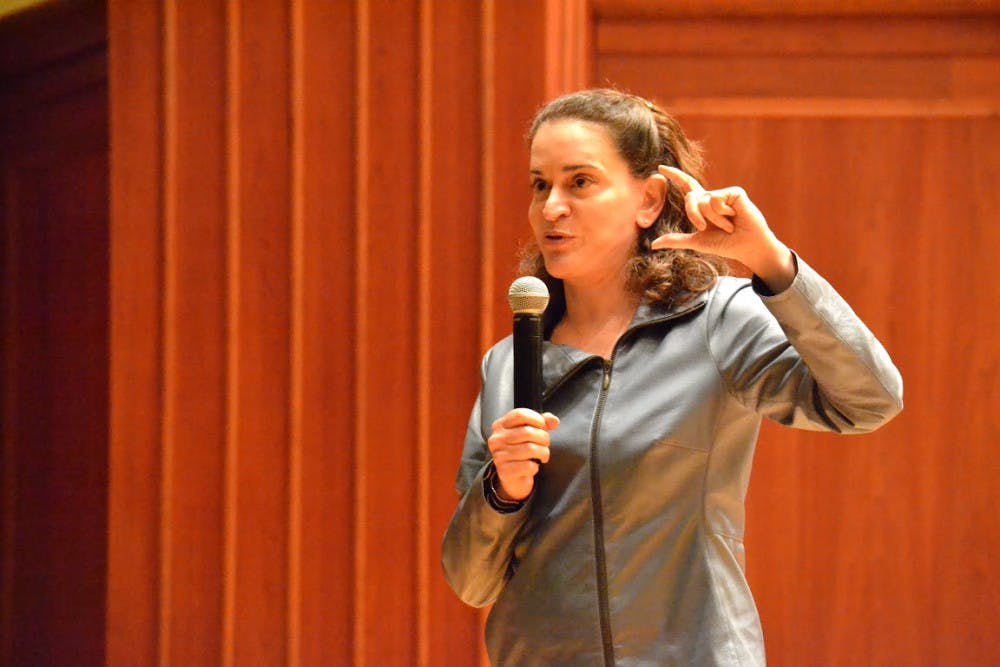By Elise Schoening
Staff Writer

Can women today truly have it all? In a lecture to students at the College on Wednesday, April 1, the president of Barnard College addressed this question and the relevancy of feminism in the United States today.
Dr. Debora Spar is an active advocate for women’s education, leadership and success. Her lecture in Mayo Concert Hall was a part of the College’s celebration of Women’s History Month.
The talk was based on Spar’s most recent novel, “Wonder Women: Sex, Power and the Quest for Perfection,” which analyzes where American women stand today, and more specifically, why our society has not come further in terms of gender equality. The original title, Spar explained, was “Confessions of a Reluctant Feminist.”
“I come to feminism reluctantly,” Spar said. “Not because I think feminism is a bad thing, but because I thought it was over. I thought the feminist movement had come and gone.”
It was during her years at Harvard Business School that Spar realized gender inequality is still a problem today. Spar taught thousands of students while at the university but noticed that it was mostly the men who continued on to the highest levels of success. In fact, many of the male students went on to run businesses at Silicon Valley, Spar said. Only a handful of the women, however, achieved the same accomplishments.
“Once you get to the top tier of any sector in this country, the women essentially disappear,” Spar said. She noted that this issue is pervasive across all careers and disciplines.
According to Spar, tokenism is a root cause of this issue, as only a few seats on a committee or board of directors will be reserved for women. Even the most qualified and intelligent women are therefore defined by their gender, which means only a select few are able to reach the highest levels of success.
Spar believes that gendered expectations and responsibilities are another barrier that create workplace inequality. Women often grow up believing they can either dedicate their time and energy to their career or to raising a family. As such, many leave the workforce to do the latter.
While the traditional notion that women should perform household and wifely duties is outdated, these gendered expectations continue to pervade American society and remain widely accepted, according to Spar. She attributes this to the fact that gender inequality today is less explicit than it has been in the past. Women now have many of the same basic rights as men and have therefore come to believe that they do not need feminism. Spar admitted that she too held this belief for most of her life.
“The year in which a woman was born really shapes how she approaches feminism,” Spar said. “Women of my generation didn’t define ourselves as feminists because we didn’t need to.”
Spar, who was born in 1963, did not have to fight for women’s rights like her mother and the women belonging to older generations had. In fact, Spar and her peers had access to birth control and reproductive rights by their teenage years. When it was time for Spar to apply to colleges and think about her future, most colleges had already opened their doors to women.
In this way, Spar’s generation grew up believing that gender equality had — for the most part — been achieved. They thought they could be and do anything as long as they worked hard enough.
The problem, however, is that the traditional expectations for women continued into the post-feminist age. Women had previously only been expected to fulfill household and wifely duties. Now they were also expected to get an education and pursue a career. Yet, the traditional household expectations for women remained then and continue today, according to Spar.
“We added to the things we expect women to do without getting rid of anything,” Spar said. “We tell girls to do both, but we haven’t changed the expectations for boys.”
According to Spar, our society has set the standards for women higher and higher, so much so that they have become unattainable. Nevertheless, women continue to strive toward this “wonder woman” ideal, which includes being beautiful and juggling marriage, children and a career, among other things. The result, Spar explained, is exhaustion and a sense of failure amongst women when they realize that they cannot do it all.
Spar urged the women in the audience to give up on this quest for perfection and to recognize how damaging gendered expectations can be. She believes this is a cultural issue and that cultures can change and evolve with time. In order to enact change and allow for more women to succeed, Spar called for unity between men and women.
In her lecture at the College, Spar argued that feminism is still relevant in the lives of men and women today, as gender inequality affects us all. She noted that men often want to help but do not think they can or that they have a place in the conversation. As such, Spar encouraged the female audience members to invite men — who represent the dominant gender — in this conversation on gender inequality so they can work towards a solution together.
“We have to start having this conversation and we have to make sure men are a part of it,” Spar said.







